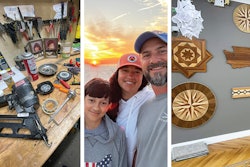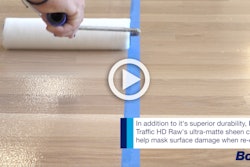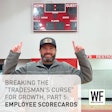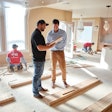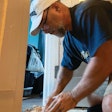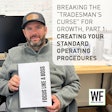When I relocated my family to southern Florida from New Jersey three years ago, it was a big change: I went from working for a good friend of mine in his hardwood flooring contracting business to starting my own company in a totally different part of the country. Except for one friend in the area—someone I had met through the NWFA schools—I didn't know a soul, much less the local wood flooring distributors, builders or designers. I had to build my business from scratch.
One thing I did that really helped was make a total plan for my business so that when I got here, I could start my business under full power. Before we moved, I went online and did all the paperwork to set up my new business, which took two months. By the time I moved, my business was technically already "open." That was important: Here in Florida, if you give somebody a bid to do work but you don't have a business with a state or county license, workers comp and insurance, you can be fined $500 for your first offense. It's probably not going to happen, but if you give a quote to the wrong person, it could, and a $500 fine is tough when you're starting out.
I also had my whole package of marketing materials ready. I had a good idea of what I wanted my logo to look like, and I paid a local printing store to tweak it. Then I had things done like my business cards and company shirts. I hired a company to make a basic Web site for about $500. It had pictures of jobs I'd done and a history of my family background in woodworking and my experience in the wood flooring industry—things to make people feel confident about hiring me.
I put a portfolio together with my degrees and diplomas from the NWFA schools, before-and-after pictures of jobs I'd done and recommendation letters from previous customers. When I would go out to a job, I would do this huge presentation, and even though I was a one-man operation at the time, it looked like my company was huge.
I made sure that the advertising on my trucks was very specific and not crowded. It included my logo, the words "hardwood floors" in big letters, and in smaller letters, "installation, refinishing, borders, inlays, dustless system"— the dustless is a big thing. The advertising on the trucks probably paid for itself in three months; I got many phone calls from that. Down here, there's traffic everywhere, and people have time to read and write down a phone number or a Web site.
I also put the NWFA member logo, the NWFA certified logo, and the Better Business Bureau (BBB) logo on my trucks. Those logos make people believe you're serious; they're a little more confident when they see you're a member of the NWFA, the BBB and ASID. It automatically clicks that you're not just doing work from the back of your van—you're a part of associations, you go to meetings, you go to conventions and you know about the current laws. I've had people tell me that they checked with the BBB to make sure my record was clean.
I did all sorts of things to try to get business. I went on job sites and talked with GCs, and I went to design firms and presented myself. I went online and used The Blue Book—it's a great tool that lists everything from architects to electricians—to find big builders, and I sent them letters and called some of them. I went to flooring stores and asked to work as a subcontractor. I would go to the ASID meetings and bring my cards and brochures and show them my pictures. Once you gain a designer's trust, they don't go anywhere else. They say, "Here's the address, go do it and send me the bill," and they don't argue about price.
One thing that helped me a lot in the beginning was an Internet lead service. These types of companies pop up when people use search engines like Google or Yahoo to look for things like "floor installation." How it works is you sign up with the service—you need your insurance, your license, all your other official business documents before you can sign up—and they will send you e-mails with leads for people who want work done. The e-mail gives a basic description of the job, and then you decide if you want to buy the lead or not. It costs anywhere from $15 to $45 per lead.
Another thing I did was make a bunch of lawn signs. Now I do estimates back in the office with the computer, but at first I would give a hand-written estimate right there on the spot because I wanted the job right away. If they agreed to the estimate immediately, I would put that sign in their lawn before I left, even though I wasn't starting the work for probably another week. Neighbors want to know what their neighbors are doing—if the neighbor down the street gets her floors done, they want their floors done, too.
My goal with my company was to go for higher-end jobs, but to start I couldn't be that picky. To get my foot in the door, I couldn't charge the prices that I charge now, but I did try to avoid people who were going only on price. Even though I needed business to pay my bills, I always tried to not look desperate—you don't want to pass that feeling on to your customers. If I did an estimate and they didn't call back, I would call them just to touch base and see if they had any questions, but I never put any pressure on like "We've got to get this done!" I focused on the very principle of what I believe in—being responsible. That is, if you present yourself and say you will do something, do it how and when you said you would. Here in Florida, it's amazing: You see contractors drive by, and the slogan on their van is, "We show up"! I got some jobs because I was the only one who actually showed up to do an estimate.
Although I tried so many ways to get the new business started, it still took two to three months before my phone really started ringing. Because Florida is such a transient state and there are lots of scams, people here, especially builders, can be skeptical of someone new. Looking back, I think the most important part of starting the company successfully was being ready from the first day as if the company had always been in business. If you have all your marketing pieces together and you have the confidence to make a great, professional presentation, potential customers don't know you've only been in business for a month.
Three years later, all that hard work has paid off—my wife now works in the office, my brother moved here and is now our partner, and we have six employees—but I'm glad those first few months are in the past.















